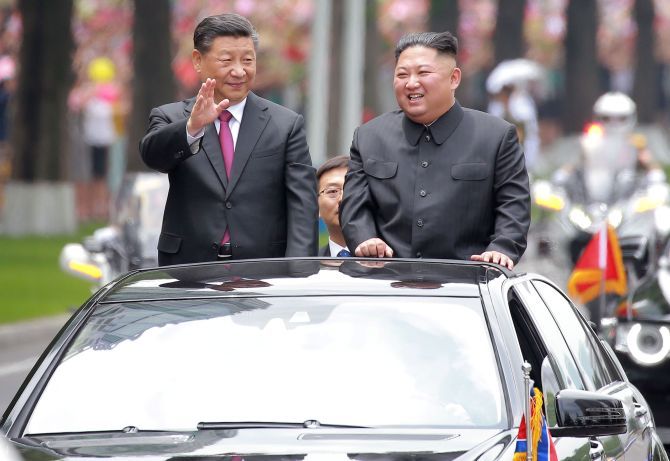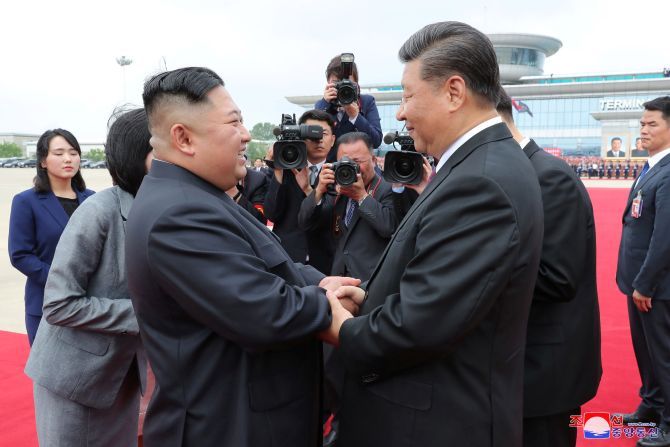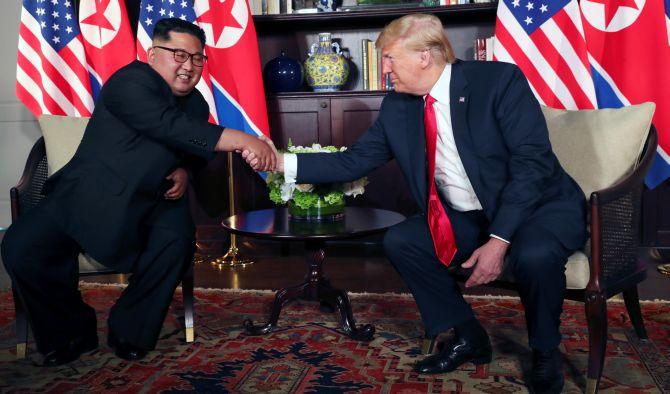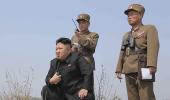Ahead of the G-20 summit in Osaka this week, Xi has reasserted China's role as a global player, points out Dr Rajaram Panda.

The flurry of summit diplomacy saw another milestone when Chinese President Xi Jinping traveled to Pyongyang on June 20 for two days 'at the invitation' of North Korea's mysterious and mercurial leader Kim Jong Un, the first by a Chinese president to North Korea in 14 years and the fifth meeting between Xi and Kim in 15 months.
Then Chinese president Hu Jintao visited Pyongyang in 2005 for a summit with then North Korean leader Kim Jong Il, Kim Jong Un's late father.
United States President Donald J Trump will visit South Korea next week for a summit with South Korean President Moon Jae-in where the prospect for a third summit between Trump and Kim, besides other issues, are expected to be discussed.
The Kim-Xi summit comes as both leaders are locked in separate disputes with the US. Xi over trade and Kim over nuclear weapons.
Since Xi is scheduled to meet Trump at the G-20 summit in Osaka this week, Kim is believed to have passed on a message to the American president, hoping to revive talks.
The two Trump-Kim summits in June 2018 (Singapore) and February 2019 (Hanoi) yielded no outcome.
While Washington wants North Korea to abandon its development of nuclear weapons before international sanctions are lifted, Pyongyang seeks a step-by-step approach in which its moves towards denuclearisation are matched by US concessions, notably a relaxation of economic sanctions.
China and North Korea being all weather friends for seven decades, Xi was happy to endorse Kim's call for an incremental disarmament process.
Since both North Korea and the US suffer from mistrust, Xi's role to play some part in removing this sentiment is important.
As a Xinhua commentary observed on the eve of Xi's visit, both sides 'need to have reasonable expectations and refrain from imposing unilateral and unrealistic demands'.
Thae Yong Ho, the former North Korean diplomat who defected in 2016, believes Kim may offer to abandon some of his nuclear facilities in a bid to set up a third summit with Trump, but such a move could be only to buy time and not to denuclearise fully, as demanded by the US.
Though relations between China and North Korea grew somewhat rocky at a time when Kim was consolidating his position on a firm footing and continued to build his country's nuclear weapons capabilities threatening regional stability, both nations remain key partners built on strategic considerations.

In an extremely unusual move, Xi contributed an article to the North Korean daily Rodong Sinmum on June 19, on the eve of his visit to Pyongyang.
This follows North Korea's designation of Xi's visit on June 20 as a 'State visit', a departure from the 'official goodwill visit' status.
This appears to be the first time a Chinese leader has contributed to the North Korean daily in the lead-up to a visit.
The article, titled 'Let us continuously engrave a new chapter of the era inheriting the friendship of China and the DPRK', and carried on the front page of the Rodong Sinmun a day before Xi's visit, wherein the Chinese leader unveiled a 'grand plan' for the peninsula and pledged to use the visit to strengthen Sino-DPRK ties.
The 'grand plan' was meant for securing permanent stability in the region.
Xi pledged China's 'unwaveringly support' for North Korea's 'new strategic' line of prioritising economic development over the nuclear programme.
'Trust' was the dominant theme of the editorial on the day of Xi's arrival in Pyongyang.

All along, China has backed the 'suspension for suspension' proposal, according to which North Korea would halt its nuclear and missile activities while the US and South Korea cease large-scale joint military exercises.
Beijing holds the view that both sides 'need to have reasonable expectations and refrain from imposing unilateral and unrealistic demands'.
With both Kim-Trump summits in Singapore and Hanoi yielding no result, Xi endorsed North Korea's call for an incremental disarmament process.
For Xi, the meeting was an opportunity to remind Trump with whom he is entangled in a trade war that China wields valuable influence over nuclear-capable North Korea.
What Kim wanted from Xi is support for relief from punishing sanctions.
Xi's visit also presented China with an opportunity to recommit to a friendship strained by North Korea's repeated tests of intercontinental ballistic missiles, some of which were eased at the end of 2017, thereby contributing to the restoration of mutual trust.
What transpired between the two leaders is the common viewpoints shared that North Korea is on course for 'correct direction' by reducing weapons testing and therefore deserved some sanctions relief.
Irrespective of the differences that Beijing and Pyongyang may have on the latter's weapons tests, it remains an established fact that China remains North Korea's largest trade partner and most important ally.
That message was delivered loud and clear to Trump by Xi's visit.
According to Andrei Lankov, an expert on North Korea, Xi achieved his objective of maintaining the status quo on the Korean peninsula and used the visit for leverage in the US-China trade dispute, without making it 'excessively specific'.

What is more at stake for Xi is the escalating trade war with the US, a topic that is likely to dominate discussions at the Group of 20 meeting in Osaka.
As a disrupter of the established order, Trump has been racking tensions in every part of the world by his unilateralist stands, disrupting the global norms governing relations among nations.
China is the main target for Trump's onslaught on the economic front, though North Korea, Iran, Russia, Mexico and others are on his radar.
By raising tariffs on $200 billion of Chinese products and threatening to tax an additional $300 billion of goods if Beijing does not agree to Washington's trade terms, Trump has intensified his fight with China.
It is possible that behind Xi's decision to visit Pyongyang was to convey the message to the US that if it wants its help to rein in on a defiant North Korea, it will have to bend on trade.
'He is sending a signal to Washington that China has a big role to play in achieving the denuclearisation of North Korea and that the US should not mistreat China,' observes Lee Seong-Hyon, an analyst at the Sejong Institute in South Korea.
Xi is aware that the Hanoi summit ended in a fiasco after Trump rejected a deal to lift sanctions in exchange for incremental steps toward denuclearisation.
Significantly, each of the meetings that Kim had with Trump were preceded by one with Xi and this gives rise to speculation that a third Trump-Kim summit soon could be a possibility.

Kim is aware that the economic sanctions imposed on North Korea have crippled his nation's economy.
Having built nuclear weapons, conducted nuclear tests, built missiles to launch them, Kim's next target is to achieve sanctions relief.
Unless Kim can provide food to over 10 million people, his domestic stronghold could come under threat.
By inviting Xi, Kim allowed Xi to flaunt a mediator's role on North Korea's nuclear issue, while expecting food aid from China in return.
This is the opinion of Yang Moo-Jin, a professor at the University of North Korean studies in Seoul.
For its part, China wants to encourage North Korea to believe that economic development is the real solution to security, not developing nuclear weapons.
Xi's visit to Pyongyang can therefore be seen as a new window that needs to be pursued.
Though Xi's visit did not achieve any breakthrough, and neither was it expected, it did remind other countries of China's unique position with North Korea.
Ahead of the G-20 summit in Osaka on June 27-28, Xi reasserted China's position as a global player amid growing concerns over the state of its economy.
China is not expected to give up playing the North Korea card.
South Korean President Moon Jae-in is upbeat that China's mediation could be crucial in resolving North Korea's nuclear and missile issues.
Dr Rajaram Panda, former Senior Fellow at IDSA, was until recently ICCR India Chair at Reitaku University, Japan.











 © 2025
© 2025